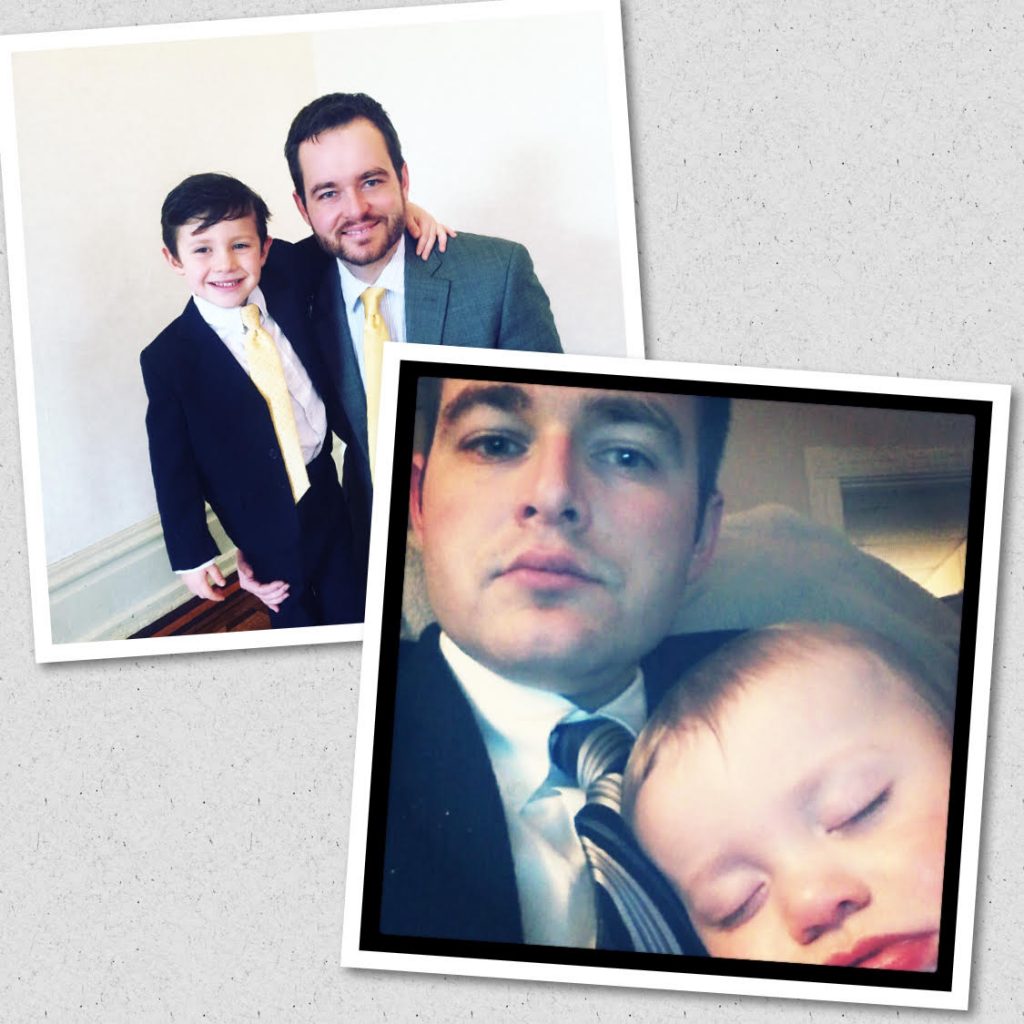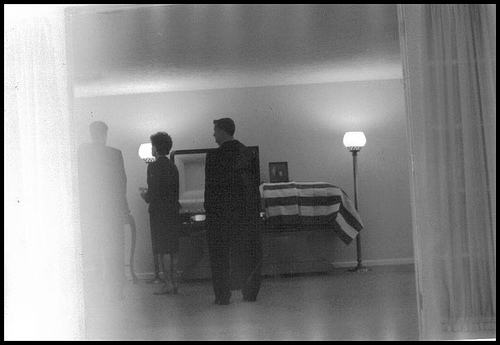Funeral Directing
10 Reasons I’m a Funeral Director
I wrote this blog post four years ago. The photo I used in that post had wee little Jeremiah resting on my chest. Four years later, and Jeremiah occasionally comes to the funeral home “to help dead people”. Times have changed — for one, my hairdresser now trims my eyebrows — but these reasons have remained.
One: Service.
A couple years ago, a granddaughter was giving her grandmother’s eulogy at the funeral home. She shared that before she would take naps at her grandmother’s house, her grandmother would warm a blanket in the dryer, and as the granddaughter laid down, the grandma would drape the warm blanket over her.
After the service was over and before the family closed the lid on the casket, I grabbed the blanket that the family had laid in the casket and warmed the blanket. When I gave the warm blanket to the granddaughter, she couldn’t withhold her tears as now she draped it over her grandmother.
Situations like this arise regularly in the funeral profession. And, as a caregiver by nature, I find great satisfaction in seeing others have more meaningful death experiences because of my efforts. I enjoy serving.
Two: Perspective.
Emerson said, “When it is darkest men see the stars.” We try our best to deny the darkness of death by consciously and unconsciously building our immortality projects. We hope that we can live immortally through such projects.
And then death. Weeping. Our projects come tumbling down. And it’s in those ashes, in the pain, in the grief, through the tears, we see beauty in the darkness. This is a perspective that funeral directors are privy to view on a constant basis. And, in many cases, the darkness can be beautiful.
Three: Affirmation.
Being told, “You’ve made this so much easier for us.” or, “Mom hasn’t looked this beautiful since she first battled cancer”, or “You guys are like family to us” means a lot to me. It’s important to know that what you’re doing is meaningful for the person you’re doing it for.
That verbal affirmation is a big reason why I continue to serve as a funeral director.
Four: Safe Death Confrontation.
When I was a child, I’d lay in bed and imagine myself dying at a young age. I imagined Death as a Monster. That fear, though, has dissipated as I’ve both worked around Death and I’ve grown to be comfortable with my own mortality and the mortality of those I love.
Perhaps there’s no greater freedom than to live life with a healthy relationship with Death. That healthy relationship allows you embracing each moment, realizing that we are not promised tomorrow. This good relationship with Death has been given to me by the funeral profession.
Five: Kisses.
From old(er) women. Big sloppy kisses from older women. And what makes it even better is if they follow up the kiss with a, “If only I was 50 years younger ….”
Six: Power and Obligation. You give us power every time you open up your family life and your grief to us. And when you give us that power, there’s a certain satisfaction that comes with treating that vulnerability with as much honor as we can.
We honor your loved one as we prepare them. We honor you as we serve you. The power you give us, and our obligation to that vulnerability is the grounds that produce honor.
Seven: Lack of the Superficial.
There’s so much BS in the world. We pursue bigger cars, bigger houses and bigger salaries that we become so materialized we can barely stand honesty, vulnerability and spirituality.
That all changes around death. Suddenly, you wish that the time you spent pursing that raise had been spent with your dad. Suddenly, you find some honesty about your life, some perspective and maybe even some spirituality.
I hate BS. I love honesty. I love spirituality. And I love watching as death helps us become human.
Eight: Informs my Perspective on God.
Whether or not funeral directors are religious, you’ll find that almost all are spiritual. Whether or not they believe in God, death has a way of making us look at the deep, the beyond and the transcendent.
For myself, so much of my faith has been informed by the doubt of death. I see God in a whole new dark. And it’s good. In fact, I’ve come to believe that God dwells with the broken because – it would seem – God too is broken.
Nine: Constant Challenge.
Somebody said, “It’s the perfect job for someone with ADHD because there is constant change.” Constant change and constant challenge.
Whether a call at 4 AM; or a particularly tragic death; this job is always pushing us and (hopefully) makes us into stronger people.
Ten: Our Associates.
Today, a nurse – on her own free time – tracked down the hospital release for us. I told her, “You’re wonderful.” Every time we interact with hospice nurses, I always praise them for their work, for their love towards the family. When a church provides a funeral luncheon, I try to tell the workers that they are providing grace in the form of food. When a pastor totally connects with the family, I tell him/her how great a job they’re doing.
When somebody dies – during the hardest moments of life – we see the best in people. As I said in the beginning, sometimes the darkness is beautiful; and, sometimes the darkness makes us beautiful.
There’s many a burden to be borne in this business; which is why I have to remind myself of the reasons I remain a funeral director.
If you’re interested in how I’ve processed death and death care, you can shower yourself death stories by preordering this. If you don’t like it, my mother promises to buy it back.
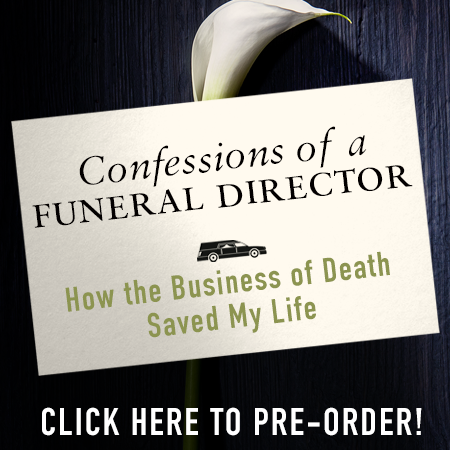
As a Funeral Director, Here Are 10 Questions You Should Never Be Afraid to Ask Me
One. Can I ask you a weird question?
THERE ARE NO WEIRD QUESTIONS. Dying, death and death care are clouded in a sense of mystery. After our loved ones die, they’re whisked away by the hospital staff, or by a funeral director. Once at the funeral home, the body is either transformed through embalming or cremation. That whole period — from death to disposition — offers all too many questions for the deceased’s loved one. This is why there are no weird questions. Ask us anything and everything and we’ll give you an honest answer.
Two. Can I help?
Firstly, this is YOUR loved one. It’s not ours. One of my sayings I like to tell families to reaffirm that idea is this: “you’ve loved and cared for them up to this point, so don’t stop now.” There are some things we can’t let you help with, like embalming, but there are a hundred other things like dressing your loved one, helping in the transfer, doing the hair, makeup and even riding in the hearse.
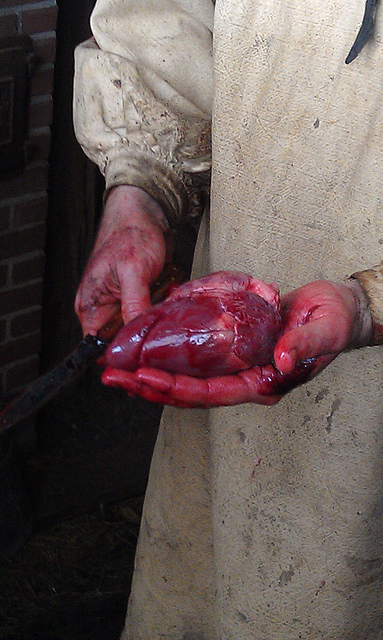
URL: https://www.flickr.com/people/timomcd/
Title: Pig’s Heart
Year: 2011
Source: Flickr
Three. Can you fix …?
If you’re having a viewing, it’s always good to pre-view your loved one before the public viewing. If mom’s hair is off, if the clothing isn’t on correctly, if it isn’t your mother lying in the casket … you need to ask us to fix that problem.
Four. Can I see your General Price List?
The General Price List shows the itemized list of our prices so you can make an intelligent financial decision when shopping for a funeral home. In fact, the Federal Trade Commissions requires us to give you this list. The FTC states, “You must give the General Price List to anyone who asks, in person, about funeral goods, funeral services, or the prices of such goods or services.”
Five. Can I have a little longer with my loved one?
OMG, yes. And any funeral director who responds otherwise should be fired. Remember, this is your loved one, not ours.
Six. Can you rub my back?
Embalmers generally massage the arms, legs, and face of the deceased to help with fluid distribution. So, we are able to massage. And even though your body might be strained from grief, we’re probably gonna say “no” to this question. Sorry. You’ve got be dead to get that service.
Seven. Can I watch …?
This is a valid question. Again, most funeral directors will say “no” if you ask to watch an embalming, but just about anything else is on the table. Many crematories will even let you hit the “start” button.
Eight. How can I save money?
Funeral directors should have YOUR best interest in mind, not their own. If you want an inexpensive funeral, the funeral director knows how to cut corners better than anyone. (And, just as free advice, this question should be asked BEFORE your loved one passes. Call around. Ask funeral homes for their GPL. And find one that you’re both comfortable working with, AND, is inexpensive. You could save a couple thousand just by shopping around.)
Nine. “Can you cut out the heart of my husband and have it cremated separately so I can put the heart ashes in a cremation locket? I want the cremation locket of his heart next to my heart.”
This was an actual question a widow asked a buddy funeral director. He said “no.”
Ten. Can you help me with …?
If we got into this work for anything than other than service we’re doing it entirely wrong. It’s not bad if we make money, but the main reason we’ve maintain a place in society is because we’ve helped you in your hardest moments. Good funeral directors are service oriented, and the best ones are both service-oriented and intelligently helpful.
If you like my words, you can buy a whole bunch of them. Please support this project by preordering:
10 Pieces of Advice for Picking Up a Dead Body
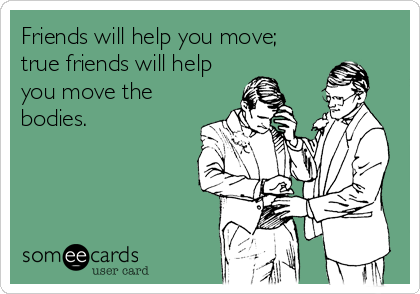
Over the course of my career as a funeral director, there have been a handful of times when I’ve had to call on my friends to help me with a removal. All but one of my friends have answered my call with a, “Yes, I’ll help you.” Driving to the deceased’s home provided me with just enough time to go over the basics of a house removal. So, if a funeral director friend ever asks you to go on a house-call, here’s the advice I always give my buddies.
One. Never, ever rush the family.
I always tell the family, “You have as much time as you need.” Permission is so key. But word’s aren’t enough. Your body language has to say the same thing. So, if the family is waiting on a relative to arrive from an hour away, or if they just need an extra half an hour with the deceased, take a deep breath, relax, find a seat on the sofa, and let grief run its course.
Two. Always do a dry run first.
You got to do some reconnaissance before you make the actual removal. The deceased could be on the third floor of the attic. They could be sitting on the toilet, bent in half and hard as a rock from rigor mortis. They could be in the basement slumped over in their recliner. Usually, they’re under hospice care, in an easy to access bed, but it always helps to know what you’re getting into before you get into it.
Three. Give the family permission to be there while you make the transfer
Families rarely want to watch you make the transfer of the body onto the stretcher, but sometimes they not only want to be there and watch, they want to help. And for that 10% that want to be part of the transfer, it means the world to them if you invite them. I usually say, “you’ve loved and cared for them up to this point, so don’t stop now.”
Four. DON’T EVER COMMENT ON THE BODY
Unless you’re saying something affectionate and empathetic, I don’t care if the deceased’s body has three breasts and two heads, this isn’t time for commentary. You don’t comment on the smell, on the weight, on the funny look on the deceased’s face. Maybe it’s obvious that the deceased died during coitus, just keep your smiles to yourself and your words in your head. I know this is an obvious piece of advice, but when we get around awkward situations, some people attempt to cope by stating the obvious.
Five. When you’re going to lift the deceased onto the stretcher, don’t grab them under the ass.
Or you’ll get poop on your hands or gloves.
Six. MAKE SURE THE STRETCHER CLICKS!!!
When you raise the stretcher into the upright position, you’ll hear a little “click” sound which means it has locked in place. If you don’t hear the click, bodies be dropping.
Seven. If you drop the body, don’t curse.
We all make mistakes. God forbid your mistake is a dropped body, but if you do, don’t yell, “shit”, or “penis waffle” or “tater tits”.
Eight. If the family is leery of seeing their loved one being carted out, let them know you’re coming.
Some families don’t want to see or hear any bit of the transfer process. If you’re dealing with this type of family, let them know that you’re about to come through the house so that they can go to another room if they wish.
Nine. Make sure your cell phone is off.
Funeral directors think it’s cute to have their ringer set to the song “Another One Bites the Dust” or “Highway to Hell”. And that’s fine unless your ringer goes off as your carting Grandma through the house on a removal.
Ten. Drive away slowly from the house.
I’ve had a number of families tell me, “I really liked it when you drove off slowly.” Hearses have massive engines and they tend to be rear wheel drive, which means massive donut and burnout potential. But donuts after a successful removal? Probably not the best way to end your day.
On my blog, I generally write fun little posts like the one you just read. But, if you’re interested in the stories of death care, here’s my book:
10 Terrifying Things About Funeral Homes You Didn’t Know: A Response
Answers.com recently unpublished an article entitled “10 Terrifying Things About Funeral Homes You Didn’t Know”. Although I appreciate attempts to talk about death and funerals (and I do appreciate the fact that they took the article down), the sensationalized “answers” in the article, which I put in quotation boxes, are much more concerned about garnering internet views, and subsequently, the money that comes with those views, then they are about the quality of their answers. Sensationalizing facts on the internet is nothing new, but when you damn the funeral industry for exploiting the masses and you’re hypocritically attempting to do the same with a sensationalized article, you need to be called out.
Here are their “10 Terrifying Things” from the Answers.com article and my responses.
1. Death is Big Business: Pardon the pun, but funeral homes make a killing. The caskets in funeral homes are set up to where the grieving family members see the most expensive caskets. It’s a billion dollar industry, and bigger funeral service providers will attempt to acquire every aspect of the business, such as florists and tombstone engravers.
There’s a lot of billion dollar industries. Fantasy football is a 70 billion dollar industry. Video games. Cigarettes. Shoes. Starbucks Coffee.
In fact, you’d expect the funeral industry to be a billion dollar industry because unlike Cigarettes, everybody eventually needs death care. The worth of industry isn’t the determining factor if the industry is making “a killing.” Rather, the gross profit margin and net profit margin are the numbers we should be concerned about. In 2016, Dunkin Donuts’ gross profit margin was 82.07%, meaning that for every dollar spent at Dunkin Donuts, 82 cents was gross profit, which you’d expect for something as cheap to produce as coffee. The net profit margin is the more accurate way to measure a company’s health as it takes into account the whole of the company’s expenditures. For Dunkin Donuts, the net profit margin in 2016 was 23.60%.
The funeral industry isn’t nearly as measurable as Dunkin Donuts, but here are some rough estimates from 2010: The gross profit margin was 62.5%, which ranked about middle of the road for similar service industries. But, many of us independent funeral homes had around 10 to 30% gross profit margin. My guess would be that corporate funeral homes drive up the overall GPM for the industry. From some stats I found (again, this isn’t measurable like Dunkin Donuts), the net profit margin hovers around 10.70%.
In other words, even if those numbers I used aren’t entirely accurate, it’s very hard to argue that the funeral industry is making a killing.
2. They Take Advantage: People in grief are extremely vulnerable, and some funeral service providers are not above taking advantage of that. A funeral director can easily steer families in the direction of more expensive flowers or coffins. At the time, it seems like a showy, elaborate funeral is the only way to honor the deceased.
For those of us funeral directors who are ultimately concerned about service, the idea that we’re “taking advantage” of our customers frankly pisses us off.
It’s like assuming that all Catholic priests are pedophiles.
Or that all Matthew McConaughey movies involve shirt removal (he keeps his shirt on in Interstellar)
Answers.com is making a blanket statement that simply doesn’t cover us all. In fact, it’s these blanket statements like this that incite some anger in those of us who find joy in helping those in their greatest hour of need and confusion. For the good funeral directors, our joy is helping you, not exploiting you.
And while I can say that many — if not most — in this industry exist for service, there is the dark side — those few — that do as Answers.com describes.
3. Are You Dead or Just Happy to See Me? When the body begins to decompose, certain areas known to have heavy concentrations of bacteria often swell to more than twice their normal size. Undertakers have to work fast to drain the bodies of all fluids, and they pack all of the body’s openings with cotton to prevent leakage.
If you want embalming, then yes, we do drain the body’s fluids. And we usually pack the nose with cotton to keep any liquids from running down the face during a viewing. If we take out the sensationalism, this one is mostly true.
4. Broken Parts: Funeral home employees are masters in the art of restoration. They often have to make a body presentable for viewing, despite how the person died. Sometimes, it’s as simple as using cosmetics to cover minor scrapes or bruises, but other times, morticians have to stitch bodies back together.
Answers.com got this right. Although I’m not sure this qualifies as “terrifying”. Bwahahaha. I’ll put makeup on your face. Bwahahah. Let me trim your beard. Look at me, I’m a master of restoration and I’m TERRIFYING.
5. Embalming: Everyone knows that embalming is the process of removing all the fluids from a body and replacing them with preservatives. What happens to all those fluids from the body? They go right into the public sewage system. That’s what’s really running through your pipes.
Right again, but when you think about the other things that get poured down the drawn (various chemicals, condoms, and menstrual flow), it’s not entirely terrifying.
6. The Eyes Have It: A person’s eyes are not usually removed from the body when its embalmed. They do start to flatten out, so morticians usually place a cap underneath the eyelid so that it still looks curved, or they’ll re-fill the eye to its normal size.
ZZZZZzzzzzz. Eye caps. Yes, we use eye caps. No, we don’t remove eyes.
7. They May Not Be Doing Their Jobs: In 2002, it was discovered that the Tri-State Crematory had been scattering the bodies rather than properly cremating them. Over 300 hundred bodies were discovered on the crematory’s property. It was revealed that the crematory had been giving the families concrete dust instead of ashes. Some of the bodies were never identified due to body decomposition.
Sadly, this one is true. Tri-State Crematory did do just as they say.
8. Please Wait Outside: When funeral directors have to go into someone’s home to retrieve a body, they are often in a hurry. The grieving family naturally wants time to say goodbye, but family members can hinder the work of funeral directors.
If you EVER feel any type of pressure from a funeral home or funeral director FIRE THEM! Seriously, just fire them. The fact is that your mind is already clouded by grief and the last thing you need in your life is someone trying to push you around. You just experienced a death in your life. You need people who will give you the time and space you need, NOT people who want to push you around.
And, no, we are not “OFTEN IN A HURRY.” Do you really think a funeral home would survive in a community if we’re always in a hurry? No. We wouldn’t. Most of us treat families like they are our own family.
9. Drops Happen: Sometimes, dropping the body is unavoidable. Removing bodies of overweight people from five-story buildings, for example, can prove to be quite tricky. Hopefully if it happens, it doesn’t occur in the eyes of the family.
Yes, drops do happen. I’ve handled a few thousand deceased persons and I’ve never dropped one. But, it might happen. I hope it doesn’t.
10. Caskets Don’t Have to Be Expensive: Caskets are where funeral homes make a lot of their money — the average price of a casket is over $1000. However, a nice casket can be bought between $400 – 600. You just have to shop around. A decent service for your loved one doesn’t have to put you in debt.
Casket’s don’t have to be expensive and many funeral homes do mark up their caskets, BUT I’m not sure a “nice” casket can be bought between $400 to $600. WalMart sells caskets, but not one of them is under $1,000. We sell a couple caskets for under $1,000. So, yeah. I don’t know where they came up with that $400 to $600 price range unless you simply want a cardboard box (which is totally cool if you do).
If you want to read about why I’m a funeral director (and it has little to do with money), you can buy my words.
10 Things Funeral Directors Love
One. Short Graveside Services on Extremely Hot or Extremely Cold Days
Sweat rolling down your back and into your underwear while you bake in the sun for a 45-minute graveside service is almost as equally painful as losing the feeling in your toes and fingers while you do the same in the winter. Funeral directors — and families for that matter — love short graveside service in either temperature extremes.
Two. When the family say, “Mom hasn’t looked this good in 20 years”
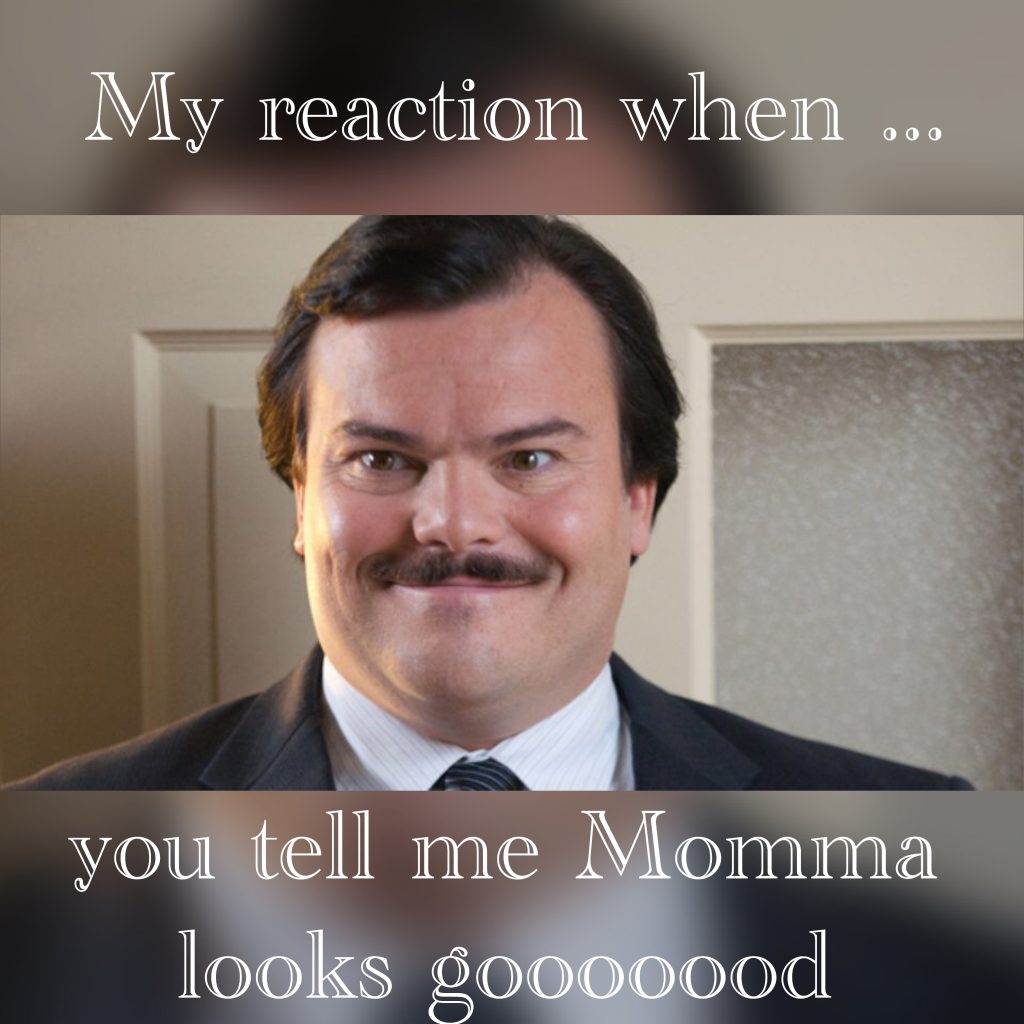
Three. Burial Dresses that are funeral appropriate
The lost and found bin at a dance club is not an appropriate place to get grandma’s funeral clothing. It’s awkward. For all of us. But when you bring in a lovely dress or nightgown that screams “I WAS MADE FOR A FUNERAL” it makes our job so much easier.
Four. When those arteries and veins pop right out like they’ve been waiting for you
There are times when you go to embalm and it’s almost like the deceased telepathically moved their carotid artery and jugular vein right where you need them to be.
Five. “Why yes, here’s the death certificate. And it’s already signed.”
For those funeral directors that work in states where eSignatures haven’t totally caught on, a signed death certificate can literally save us hours of sitting and waiting. A signed death certificate can often be the difference between us seeing our son’s baseball game and not seeing it.
Six. Those times you have a house call on the third floor of the apartment building and the deceased only weights 100lbs.
As funeral directors, we honor everybody and every body, but there are times when our backs really appreciate it when 100lbs is all we have to carry down a couple flights of stairs.
Seven. When the family of the deceased actually love each other.
This is the best. In fact, just now I finished meeting with a blended family where everyone loved each other. No one was fighting and nitpicking about this and that. They were being genuinely generous and empathetic to each other’s wishes. It’s a breath of fresh air.
Eight. That time at the cemetery when everyone takes a shot of Jack and says to you, “Dad would be offended if you didn’t partake.”
Yesssssss, pleeeaaaassssse.
Nine. Families that prearrange and prepay their funeral.
The longer I’m in the business, the more difficult it is for me to convince people to not become funeral poor. Funeral poor is simply when a family spends too much money on things they can’t afford. The difficulty is usually this: when a young person dies from an accident or a drug overdose, there’s usually very little funds available, but because the death was ugly, the family wants the last goodbye to be extra beautiful. When a family has prepaid, or pre arranged the funeral and everything has already been chosen and everything has already been paid for, it makes the whole process so streamlined and easy for both us and the family.
Ten. Sloppy kisses and extra long hugs.
When I was young in the funeral business, I’d often shy away from hugs and kisses. As I’ve grown older, there are few things I love more than a hug and a sloppy kiss from someone at a funeral.
If you like hugs, this book is a 200-page hug from me, and Death, to you A 200-page hug is a really long hug, so if you’re gonna buy it, things will probably get a little sweaty, so wear clothing that is breathable. XOXO
